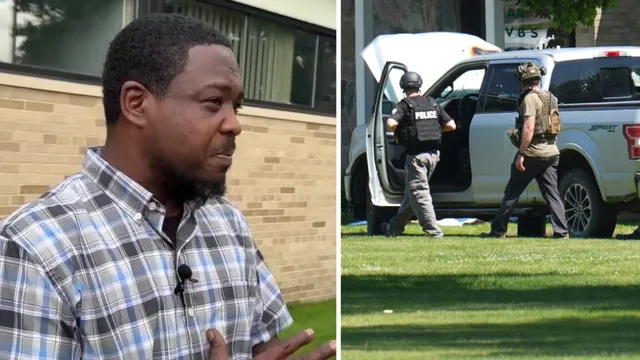
Brian Browning attempts mass shooting at church in Michigan
2025-06-26 15:51- Brian Anthony Browning engaged with church leadership about religious topics prior to the shooting.
- He had previously attended services at CrossPointe Community Church, where his mother is a member.
- The church's security team played a critical role in preventing a mass tragedy during the attempted attack.
Express your sentiment!
Insights
In Wayne, Michigan, on a Sunday morning, Brian Anthony Browning, 31, attempted to carry out a mass shooting at CrossPointe Community Church. Armed with an AR-15-style rifle, a semi-automatic handgun, and over a dozen fully-loaded magazines, Browning posed a significant threat to parishioners attending the service. Eyewitnesses reported a chaotic scene as Browning's actions unfolded. His mother was known to be a member of the church, and Browning had reportedly attended services multiple times over the past year, which raises questions about his motive. Before the incident, Browning had engaged in heated debates with Pastor Bobby Kelly Jr. concerning religious matters. Kelly mentioned that Browning claimed to be a prophet who had heard from God. Their conversations revealed Browning as someone seeking assistance, although he did not specify any mental health issues. Despite his connections to the church, the reasons behind his attempted attack remain unclear. Browning was run down by a parishioner driving a pickup truck before being shot by members of the church's security team. The police investigation that followed revealed additional firearms and ammunition at Browning's residence. They reported that he showed no prior criminal history, but a mental health crisis was suspected as a possible contributing factor leading to his violent actions. Interestingly, police noted that there was no connection to international conflicts, including military strikes in the Middle East, a narrative that some had speculated due to the timing of Browning's actions. Regarding the response from the church community and law enforcement, there was a significant coordination that helped avert what could have escalated into a major tragedy. Wayne Police Chief Ryan Strong publicly commended the church staff's swift actions, emphasizing that their response likely prevented many casualties. Authorities continue to investigate the detailed circumstances surrounding the shooting attempt, looking deeper into Browning's background and the factors contributing to this violent event.
Contexts
In recent years, gun violence has tragically become a pressing issue in many communities, highlighting the urgent need for conversations surrounding mental health. The Michigan church shooting serves as a stark reminder of this reality. Incidents of gun violence in places that are supposed to provide solace, like churches, emphasize the necessity of focusing on underlying mental health issues that may lead individuals to commit such heinous acts. Understanding the interplay between mental health and gun violence is crucial for developing strategies aimed at prevention and providing adequate support systems for vulnerable individuals. In examining the specific circumstances surrounding events such as the Michigan church shooting, we uncover the need for a comprehensive approach that addresses mental health care availability, societal stigmas, and community-based prevention efforts. One of the primary objectives in raising mental health awareness is to dismantle the stigma that often surrounds mental illness. Many individuals with mental health challenges face discrimination and fear seeking help due to societal misconceptions about their conditions. By fostering an environment where individuals feel safe discussing their mental health without fear of judgment or ostracization, communities can create a foundation for early intervention and support. Public forums, educational programs, and partnerships between mental health organizations and local institutions like churches can play a significant role in promoting understanding and empathy, helping to remove barriers that often prevent individuals from accessing needed care. Furthermore, enhancing the support available within communities—especially in areas struck by violence—requires a collaborative effort among mental health professionals, educators, law enforcement, and community leaders. Implementing training programs that equip community members with skills to identify and respond to warning signs of mental health crises can empower them to take proactive steps in helping at-risk individuals. Establishing crisis intervention resources, such as hotlines and community outreach teams, can provide immediate assistance to those in distress while fostering a safety net for individuals thinking about harming themselves or others. These initiatives can ultimately reduce the frequency of violent incidents by addressing mental health needs before they escalate into crisis situations. Regrettably, the tragedies seen in incidents like the Michigan church shooting underscore that merely increasing mental health awareness is not enough; it must be coupled with actionable policies and resources. Legislative measures aimed at improving access to mental health care, including funding for community-based mental health programs and policies that ensure comprehensive insurance coverage for mental health services, are vital. Additionally, engaging in open dialogues about gun safety in tandem with mental health awareness can lead to more effective regulations that prioritize the safety of all community members. By integrating mental health into the broader discussion of gun violence prevention, we can work towards creating a society that values the well-being of all individuals and addresses the root causes of violence.